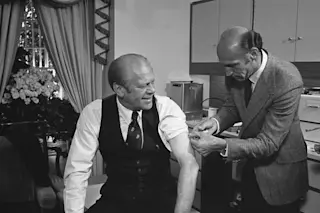Vaccines were once thought of as an axiomatic good, a longed-for salvation in the form of a syringe, banishing crippling and deadly infections like polio, smallpox and tetanus. But within the past few decades we have seen the emergence of anti-vaccination movements and a rise in cases of childhood diseases that are entirely preventable with a quick jab to the arm.
Over the past five years, outbreaks of mumps, measles and whooping cough have cropped up throughout the country. And then, of course, there is widespread skepticism among the general public on influenza and the merits of a seasonal flu shot. Even as outbreaks of avian and swine flu have periodically emerged in this country, there are still people who resist vaccination against the flu. This seemingly pervasive opposition to flu vaccination is not without its historical and sociological roots.
Some of the American public’s hesitance to embrace vaccines — ...














